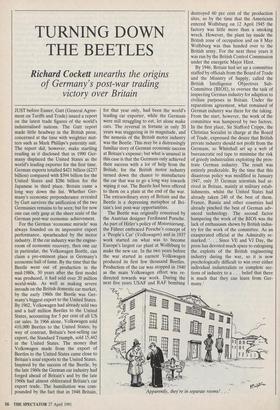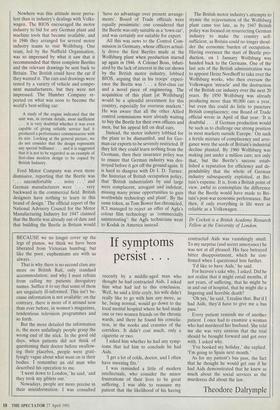TURNING DOWN THE BEETLES
Richard Cockett unearths the origins of Germany's post-war trading victory over Britain JUST before Easter, Gatt (General Agree- ment on Tariffs and Trade) issued a report on the latest trade figures of the world's industrialised nations. The Gatt report made little headway in the British press, concerned at the time with weightier mat- ters such as Mark Phillips's paternity suit. The report did, however, make startling reading as it disclosed that in 1990 Ger- many displaced the United States as the world's leading exporter for the first time. German exports totalled $421 billion (£237 billion) compared with $394 billion for the United States and $286 billion for the Japanese in third place. Britain came a long way down the list. Whether Ger- many's economic preponderance revealed by Gatt survives the unification of the two Germanies remains to be seen; but for now one can only gasp at the sheer scale of the German post-war economic achievement.
For the German 'economic miracle' was always founded on its impressive export performance, spearheaded by the motor industry. If the car industry was the engine- room of economic recovery, then one car in particular, the Volkswagen Beetle, can claim a pre-eminent place in Germany's economic hall of fame. By the time that the Beetle went out of production in the mid-1980s, 50 years after the first model was produced, it had sold over 20 million world-wide. As well as making severe inroads on the British domestic car market, by the early 1960s the Beetle was Ger- many's biggest export to the United States. By 1962, Volkswagen had already sold two and a half million Beetles to the United States, accounting for 5 per cent of all US car sales. In 1966 alone, Volkswagen sold 410,000 Beetles to the United States; by way of contrast, Britain's best-selling car export, the Standard Triumph, sold 15,442 in the United States. The money that Volkswagen made from the export of Beetles to the United States came close to Britain's total exports to the United States. Inspired by the success of the Beetle, by the late 1960s the German car industry had forged ahead of Britain's and by the late 1960s had almost obliterated Britain's car export trade. The humiliation was com- pounded by the fact that in 1948 Britain, for that year only, had been the world's leading car exporter, while the Germans were still struggling to eat, let alone make cars. The reversal in fortune in only 20 years was staggering in its magnitude, and the nemesis of the British motor industry was the Beetle. This may be a distressingly familiar story of German economic success at Britain's expense; but what is unusual in this case is that the Germans only achieved their success with a lot of help from the British; for the British motor industry turned down the chance to manufacture the car that was to go a long way towards wiping it out. The Beetle had been offered to them on a plate at the end of the war. The extraordinary story of Britain and the Beetle is a depressing metaphor of Bri- tain's lost post-war opportunities.
The Beetle was originally conceived by the Austrian designer Ferdinand Porsche. As part of Hitler's policy of Motorisierung, the Fiihrer embraced Porsche's concept of a 'People's Car' (Volkswagen) and in 1937 work started on what was to become Europe's largest car plant at Wolfsburg to make the new car. In the two years before the war started in earnest Volkswagen produced its first few thousand Beetles. Production of the car was stopped in 1940 as the main Volkswagen effort was re- directed towards war work. During the next five years USAF and RAF bombing destroyed 60 per cent of the production sites, so by the time that the Americans entered Wolfsburg on 12 April 1945 the factory was little more than a smoking wreck. However, the plant lay inside the British zone of occupation and on 8 May Wolfsburg was thus handed over to the British army. For the next three years it was run by the British Control Commission under the energetic Major Hirst.
By 1946, Britain had set up a committee staffed by officials from the Board of Trade and the Ministry of Supply, called the British Intelligence Objectives Sub- Committee (BIOS), to oversee the task of inspecting German industry for adaption to civilian purposes in Britain. Under the reparations agreement, what remained of German industry was there for the taking. From the start, however, the work of the committee was hampered by two factors. In the first place, Sir Stafford Cripps, the Christian Socialist in charge at the Board of Trade, expressed the desire that British private industry should not profit from the Germans, so Whitehall set up a web of bureaucratic red tape to minimise the risk of greedy industrialists exploiting the pros- trate German industry. The result was entirely predictable. By the time that this disastrous policy was modified in January 1947, only 35 German scientists had ar- rived in Britain, mainly at military estab- lishments, whilst the United States had already taken 240 of the best of them. France, Russia and other countries had already pinched the best of German adv- anced technology. The second factor hampering the work of the BIOS was the lack of enthusiasm shown by British indus- try for the work of the committee. As an exasperated official at the Admiralty re- marked: `. . . Since VE and VJ Day, the press has devoted much space to eulogising the exploits of the British engineering industry during the war, so it is now psychologically difficult to win over either individual industrialists or complete sec- tions of industry to a . . . belief that there is much that they can learn from Ger- many.'
`Apparently, they're in separate rooms! . . Nowhere was this attitude more preva- lent than in industry's dealings with Volks- wagen. The BIOS encouraged the motor industry to bid for any German plant and machine tools that became available, and in 1946 they arranged for several motor industry teams to visit Wolfsburg. One team, led by the Nuffield Organisation, was so impressed by what it saw that it recommended that three complete Beetles and the relevant drawings be sent back to Britain. The British could have the car if they wanted it. The cars and drawings were tested by a variety of vehicle and compo- nent manufacturers, but they were not impressed. The Humber Company re- ported on what was soon to become the world's best-selling car:
A study of the engine indicated that the unit was, in certain details, most inefficient . . . it is very doubtful whether it was even capable of giving reliable service had it produced a performance commensurate with its size. Looking at the general picture, we do not consider that the design represents any special brilliance . . . and it is suggested that it is not to be regarded as an example of first-class modern design to be copied by British Industry.
Ford Motor Company was even more dismissive, reporting that the Beetle was . . uncomfortable . . . noisy . . .' and German manufacturers were . very backward in the commercial field. British designers have nothing to learn in this brand of design.' The official report of the National Advisory Council for the Motor Manufacturing Industry for 1947 claimed that the Beetle was already out of date and that building the Beetle in Britain would `have no advantage over present arrange- ments'. Board of Trade officials were equally pessimistic: one considered that the Beetle was only suitable as a 'town car', and was certainly not suitable for export.
All this was news to the Control Com- mission in Germany, whose officers actual- ly drove the first Beetles made at the Wolfsburg plant when production started up again in 1946. A Colonel Boas, infuri- ated by the lack of interest in the car shown by the British motor industry, lobbied BIOS, arguing that in his troops' experi- ence the Beetle was . . a first-class car and a novel piece of engineering. The acquisition of this plant [at Wolfsburg] would be a splendid investment for this country, especially for overseas markets.' He was aware that all the other Allied control commissions were already waiting to buy the Beetle for their own officers and men, but his appeal fell on deaf ears.
Instead, the motor industry lobbied for the plant to be dismantled, and for Ger- man car exports to be severely restricted. If they felt they could learn nothing from the Germans, then their insurance policy was to ensure that German industry was des- troyed before it got off the ground again. It is hard to disagree with Dr I. D. Turner, the historian of British occupation policy, that 'British industrialists by and large were complacent, arrogant and indolent, missing many prime opportunities to gain worthwhile technology and plant'. By the same token, as Tom Bower has chronicled, ICI managed to reject an offer of Agfa's colour film technology as 'commercially uninteresting': the Agfa technicians went to Kodak in America instead. The British motor industry's attempts to stymie the rejuvenation of the Wolfsburg plant came too late, as by 1947 British policy was focused on resurrecting German industry to make the country self- sufficient, as Britain could no longer shoul- der the economic burden of occupation. Having overseen the start of Beetle pro- duction, on 1 January Wolfsburg was handed back to the Germans. One of the last acts of the British administration was to appoint Heinz Nordhoff to take over the Wolfsburg works, who then oversaw the Volkswagen 'miracle' and the destruction of the British car industry over the next 20 years. By 1950 Wolfsburg was already producing more than 90,000 cars a year, but even this could do little to puncture British complacency; one Board of Trade official wrote in April of that year: 'It is doubtful . . . if German production would be such as to challenge our strong position in most markets outside Europe.' On such a fertile mixture of complacency and arro- gance were the seeds of Britain's industrial decline planted. By 1960 Wolfsburg was making just under a million cars; not only that, but the Beetle's success estab- lished a reputation for efficiency and de- pendability that the whole of German industry subsequently exploited, at Bri- tain's expense. It is, from a British point of view, awful to contemplate the difference that the Beetle would have made to Bri- tain's post-war economic performance. But then, if only everything in life were as reliable as a Volkswagen. . . .
Dr Cockett is a British Academy Research Fellow at the University of London.



















































 Previous page
Previous page